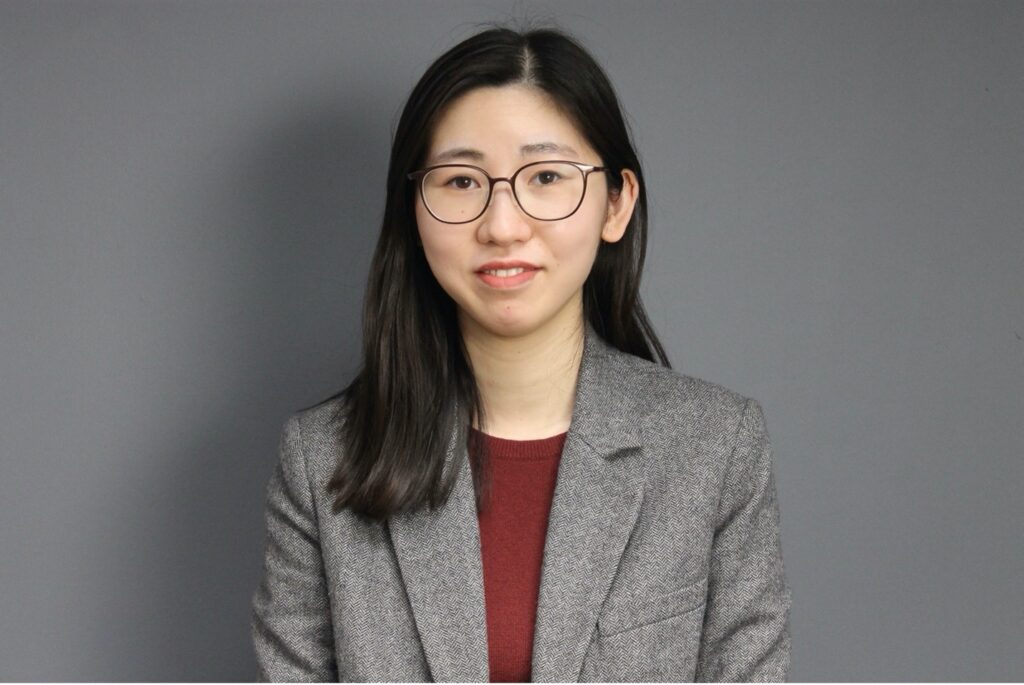Dr. Xue He’s Linguistic and Pedagogical Journey in the United States
By An Nguyen
This Winter we will be publishing a series of spotlight articles about multilingual students and faculty at DU. These articles are based on interviews that Dr. Kamila Kinyon and a group of multilingual students conducted about interviewees’ lived experiences, including continuing connection to heritage languages, role as writers and teachers at DU, and thoughts about multilingual and multicultural identity. This project is funded by a Faculty Research Fund Grant awarded to Dr. Kinyon for 2023-25. We welcome this opportunity to celebrate DU’s multilingual community.
Dr. Xue He, a Chinese professor currently teaching Mandarin at the University of Denver-Colorado, portrays the profound impact of being multilingual on both personal and professional development. Her journey, rooted in the culturally rich suburbs and then to the vibrant urban life of China, illustrates her deep connection to her heritage and her dedication to promoting cultural awareness through education to the rest of the world.
Born in the small city of Lanzhou, Dr. He was surrounded by the rich traditions of northwestern China during her early years. When she was seven, her family moved to Shanghai, a vibrant metropolis known for its cultural diversity and economic significance. This move exposed her to a dynamic blend of regional dialects, as the local Shanghainese dialect differed significantly from her Lanzhou dialect. Although this initial challenge was daunting, it contributed to Dr. He’s ability to adapt to a new linguistic environment and ultimately ignited her lifelong passion for language and culture.
“When I was seven, I started studying English and continued until college at Shanghai Normal University (B.A.),” she reminisces. This early introduction to English laid the foundation for her eventual arrival in the United States in 2015, where she pursued a Master of Arts Degree (M.A.) in linguistics at UNC-Chapel Hill and a Ph.D. in second language acquisition at the University of Iowa. She eventually secured a job at DU, where she continues to live and further her education and professional development.
Dr. He’s academic trajectory is closely tied to her cultural roots. Growing up in a country that values family, reveres traditions, and emphasizes linguistic precision, she developed a deep appreciation for the delicateness and nuances of communication through language. These cultural values heavily influence her teaching till today, as she highlights the importance of understanding not only the mechanics of language but also the cultural context in which it exists.
In her view, language is more than just a collection of words; it serves as a bridge to understanding and comprehending individuals, their values, and their lifestyles. Her educational philosophy reflects this perspective as she integrates cultural insights into her language lessons. For instance, when teaching students Mandarin grammar or vocabulary, she frequently shares anecdotes from her upbringing, offering a vivid context to the language concepts. She recalls her own difficulties with conquering English grammar and pronunciation, experiences that enhance her patience and creativity as an educator. By connecting her journey with her students’ challenges, she fosters a relatable and encouraging learning atmosphere.
Moving to the United States resulted in a major cultural transition for Dr. He. Surrounded by an English-dominant environment, she confronted the challenge of preserving her native language while adjusting to a new cultural setting. Therefore, she mentioned: “Sometimes I was doing what I called code-switching and using both Chinese and English in a language. So, I think I do that in my Chinese class. And I’m probably also doing that when I interact with my colleagues at DU.” This illustrates that even though English speakers are dominant here, she still wants to communicate in her mother tongue to uphold her cultural identity.
Moreover, taking advantage of being able to convey her strong Chinese heritage to the diverse community at DU has become a key aspect of Dr. He’s teaching. She inspires her students to view language learning as a gateway to cultural interaction, fostering empathy and a sense of global awareness. Her classroom acts as an environment where students not only learn to communicate in Chinese but also gain insights into the customs, traditions, and values that define Chinese culture. Additionally, she shared that the research while doing her Ph.D. degree in second language acquisition at the University of Iowa has enhanced her teaching methods significantly. She concentrated on the challenges faced by adult learners, particularly Americans, in order to navigate the complexities of learning Chinese. Through her research, she was able to identify effective classroom strategies that allowed her to tailor lessons to address common challenges, such as mastering tones and understanding Chinese characters.
Through her story, Dr. He demonstrates how one’s origins and experiences influence not only personal identity but also the capacity to inspire and teach others. Her journey from Lanzhou to Shanghai and, ultimately, to the United States exemplifies the resilience and adaptability of those who embrace multilingualism. Dr. He endeavors to celebrate language as a means of connection and cultural exchange. Her teaching goes beyond just language instruction, stems from sympathy, and finally enriches the understanding of the diversity and depth of human experiences.

